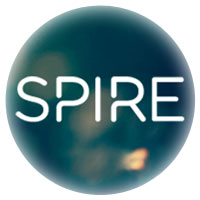
Spire on Tuesday kicked off preorders for its namesake new wearable device dedicated to promoting health by monitoring the wearer’s breathing.
Billed as “the first wearable that tracks both physical movement and state of mind,” Spire is the first activity tracker to measure breathing patterns, the company said, thereby offering new insights into periods of tension, relaxation and focus. The device offers suggestions for better well-being via push notifications and real-time activity recommendations.
Spire targets a broad range of users with the device, cofounder and CEO Jonathan Palley told TechNewsWorld.
“The desire to cultivate concentration has been rising in response to complaints about chronic distraction and multitasking — so, in a sense, everyone could benefit from Spire,” Palley said. “However, at launch, our target audience is people who have the mindset that feeling healthy at the end of the day is about more than fitness and steps tracked.”
Shipping in September
Spire is worn on the hip or torso and can be clipped to a belt or bra, for example. The device senses activity, body position and breathing, and is based on years of research capturing and using breathing signals, the company said.
The accompanying Spire app not only displays data, but also notifies the user about notable events, such as a tense 30 minutes at work. It also offers guided activities aimed at shifting the wearer’s state of mind, such as a breathing exercise or a relaxing walk.
Spire’s battery lasts seven days. It charges wirelessly using the Qi wireless charging standard and comes with a charging pad. The device’s companion app is compatible with the iPhone 4S and third-generation iPads or later.
Due to ship in September, Spire will retail for US$149.99. The company currently is offering a limited number of devices for preorder. At press time, the price was $119, with more than 350 of 1,000 available devices remaining.
‘One Interesting Thing’
“The functionality is neat, but I don’t how well it will appeal to the broader audience,” Tuong Nguyen, a principal research analyst with Gartner, told TechNewsWorld.
Assuming the device’s analytics are based on well-established science, “I think it’s a very interesting take on wearables,” he said. “It’s an added functionality I haven’t seen in the past.”
Still, “what I think when I see this is, ‘this is one interesting thing,'” Nguyen added.
Many wearable devices seem to focus on one or two interesting and unique features, and “they’re all great, all interesting,” Nguyen explained. “But I think the wearable or device that will get to be mass-market is something that combines all these functionalities. The key is that it will be a multipurpose wearable that’s easy for anyone and everyone to use.”
‘It Might Be Helpful’
By basing its functionality on the user’s breathing, Spire is “working off a principle of biofeedback that we’ve actually seen implemented in previous devices,” Ross Rubin, principal analyst with Reticle Research, told TechNewsWorld.
HeartMath, for instance, is one effort that’s similar; Stress Eraser is another, Rubin said, though it recently said it would soon shut its doors.
In any case, “the idea behind Spire is that you’re always wearing it, so it’s constantly monitoring things that cause your stress to increase,” he explained. “The idea is to achieve a sense of wellness that goes beyond counting steps or physical activity.”
Whereas the wearables category in general has been tending toward niche products — devices designed specifically for tennis or weight-lifting, for example — “this is very much intended for a broad audience,” Rubin concluded. “I think there is a fair amount of consciousness around managing stress, so it might be helpful for consumers to gain better insight into what causes them stress and perhaps find better ways to deal with it in the moment.”






















































Breathe in, breathe out, breathe in, breathe out…
LOL